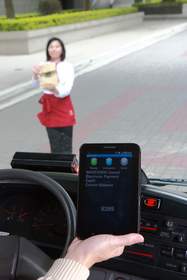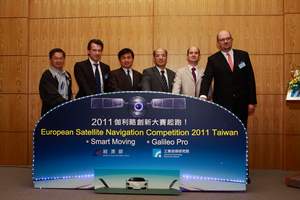HSINCHU, TAIWAN--(Marketwire - March 23, 2011) - Industrial Technology Research Institute (ITRI) launched 2011 European Satellite Navigation Competition (ESNC) today (the 23rd of March) for Taiwan region under the guidance of the Department of Industrial Technology (DoIT), MOEA.
Under the active promotion of ITRI, the current competition will for the first time include the hands-on competition with focus on the applications of Wireless Access in Vehicular Environments/Dedicated Short Range Communications, WAVE/DSRC, developed by ITRI. By sponsoring the first hands-on applications competition, ITRI sets a significant milestone because past competitions focused mainly on conceptual innovations.
Under the strong support of the European Union, ITRI spearheads for the first time the Prototyping Topic of Galileo Pro competition with the focus on inducing the developments of applications based on Wireless Access in Vehicular Environments/Dedicated Short Range Communications (WAVE/DSRC) technology, a critical technology for future telematics applications developed by ITRI. By encouraging hands-on prototyping, the applications to be submitted to the competitions will be closer to the market and more commercializable.
The competition (http://galileo.itri.org.tw/english/index.aspx) starts on April 1. Top prize is 10,000 Eurodollars with round-trip air tickets to Europe. All participants of the competition must submit their entries before midnight of June 30.
Dr. Jyuo-Min Shyu, president of ITRI, points out that the prototyping competition will be the first of its kind in the world, and will become a new paradigm of competitions in the future. More importantly, considering the fact that Taiwan has a stronghold of information and communication technologies (ICT), and Europe is renowned for a number of prestigious automakers, the integration of satellite navigation and vehicle-carried data communications will lead to the development of a vehicular ICT platform, which will become the cornerstone of a mutually beneficial, complementary relationship between Taiwan's ICT entrepreneurs and European automakers. Such a cooperative relationship will have a trail-blazing signature significance.
Dr. Ming-ji Wu, the director general of DoIT, points out WAVE/DSRC technology is a strategic bridgehead for entering the world's smart car supply chain. DoIT anticipates to provide Taiwan's innovative navigation satellite application technologies on the world market, and to introduce similar applications to Taiwan. By combining the Global Navigation Satellite Systems (GNSS) and WAVE/DSRC applications to offer innovative services, Taiwan looks forward to developing an expanding market for its ICT providers.
WAVE/DSRC is a brand new standard for real-time short range communications technology which combines advanced telecommunications and intelligent wireless data transfer technologies. It enables a car to transfer and process real-time signals to and from roadside vehicles, traffic lights, and pedestrians within 0.02 seconds, with a service range of 1 kilometer. When a vehicle is moving at 200 km/hr, the data transfer between the transmitting vehicle and the receiving one will be kept uninterrupted. For example, when a car has to stop suddenly due to an unexpected emergency, it will transmit warning signals instantly to all the automobiles trailing behind so that the trailing vehicles will be informed of the dangerous situations ahead and slow down automatically to avoid bumper-to-bumper accidents. In this care, the WAVE/DSRC can avoid serious chain car accidents on the highways.
While it could be time-consuming to find a parking lot in a crowded downtown area, with the WAVE/DSRC system a driver can reserve a parking lot, drive his/her car to the parking lot without getting a parking permit in advance. The car driver can pay parking fees electronically to check out from a car park swiftly. Such an application is quite efficient and hassle-free.
The competition was jointly launched by Ming-ji Wu of DoIT; Jyuo-Min Shyu of ITRI; Nicolas Baudouin, Policy Officer of European Economic and Trade Office; Anwendungszentrum GmbH Oberpfaffenhofen (AZO), sponsor of the worldwide GNSS competition; Ming-ren Hsu, chairman of Taiwan Telematics Industry Association, TTIA; and Chan-hong Chen, Chief Technology Officer of Advantech.
Two past winning teams of the WAVE/DSRC competition in Taiwan, the R&D teams of National Chiao Tung University and Information and Communications Research Laboratories (ICL) of ITRI were invited to present the electronic payment and WAVE/DSRC applications after the launching ceremony.
[News Dictionary]
Galileo is a global navigation satellite system (GNSS) currently being built by the European Union (EU) and European Space Agency (ESA). The system will be the third system after the GPS of the U.S. and the GLONASS developed by the Soviet Union. The Galileo system is scheduled to start operating in 2013. In order to encourage entrepreneurs to develop GNSS applications, EU has authorized Anwendungszentrum GmbH Oberpfaffenhofen (AZO) and SYSTEMS to sponsor European Satellite Navigation Competition (ESNC) with the support from Bavarian economic and technology department. With the booming development of navigation satellite applications, the Galileo innovation competitions have been spreading to major European technology strongholds. In order to more aggressively make full use of Taiwan's innovation capability for the development of world's navigation satellite applications, in 2008 Taiwan was officially assigned as a region for the ESNC under the persistent request of ITRI. As of 2010, the number of participating countries or regions in the ESNC has increased to 23 throughout the world. In terms of the competition paradigm or the promotion of the competition, Taiwan has always been an important participating country in the ESNC.
Originally, the competition was divided into two categories: 1) Regional Prize (General Topics of Galileo Master), and 2) Special Price (Special Topics of Galileo Master). Under the suggestion of ITRI and with the support of EU, the competition this year was arranged with the following features: 1) Addition of the Prototyping Topic of Galileo Pro. 2) Under the General Topics of Galileo Master category, there are three subcategories -- Safety of Life applications, Mass Market, and Professional applications. The "Smart Moving" subcategory will be added in this year's competition. In the Prototyping Topic of Galileo Pro competition, the focus will be on the development of innovative applications by integrating WAVE/DSRC and next generation satellite positioning technologies. For entries in the Smart Moving subcategory, participants can propose applications in vehicular telecommunication networks, car-to-car applications, car-to-roadside units, and car-to-infrastructure, synchronized real-time car emergency response systems, parking management, auxiliary driving, and transportation management applications.
Contact Information:
Media Contact:
Kristie Lee
ITRI, Office of Marketing Communications
Tel: +886-3-5919392

